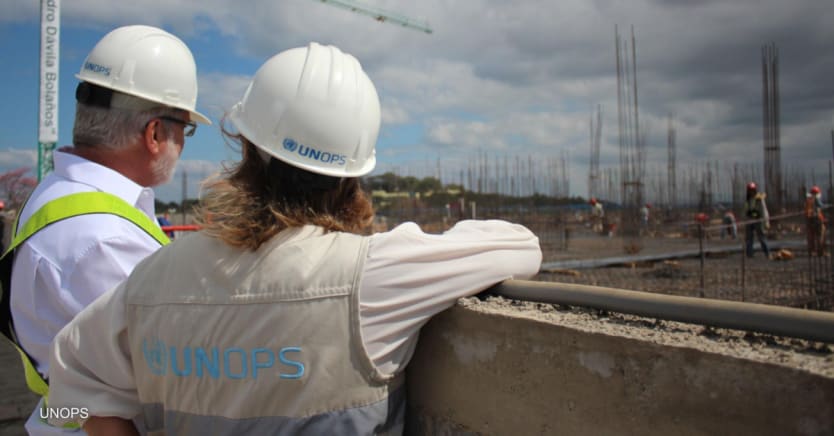Opinion: UNOPS probe shows need for impact-investing accountability

The still developing scandal at the United Nations Office for Project Services highlights what many of us in the development finance and impact-investing sectors already know: A lack of accountability and good governance inevitably leads to systemic abuse. UNOPS’ ambitious impact investment initiative — $63 million to build affordable housing in Ghana, India, Guinea, Nigeria, and elsewhere, along with two wind farms — hasn’t resulted in one new home, and now the U.S., a U.N. donor, is calling for new funding to UNOPS to be halted.
By essentially moonlighting as a development finance institution without any of the safeguards, due diligence, transparency, and accountability measures needed to minimize risk, UNOPS courted disaster, and it is now dealing with the inevitable fallout. UNOPS is not unique in this regard. Many impact investors still lack formal accountability systems that would allow project stakeholders and affected parties to address abuse.
For institutions like UNOPS that engage in impact investing abroad, accountability frameworks that allow communities to have a decisive say in projects that impact them are essential to preventing and remediating instances of abuse.
Even where there is good intention, risk is inevitable in any development finance initiative because almost any internationally financed investment is top-down in nature. Communities situated near these projects often have no voice in the planning and implementation stages. A lack of local buy-in and information, coupled with often poor social and environmental due diligence in the project-planning stage, can lead to grievous social, economic, and environmental harm.
In recognition of the inevitable risk involved in top-down development finance, the United Nations’ main development finance arm, the U.N. Development Programme — which shares an executive board and works closely with UNOPS — launched an accountability mechanism in 2015 to investigate and remediate harm caused by development projects. UNDP projects are also governed by environmental and social rules. For whatever reason, UNOPS didn’t follow either of these examples before jumping into the impact-investing fray.
The case of communities in Myanmar’s Tanintharyi region, who are facing displacement, a loss of livelihood, and the threat of renewed conflict as a result of a UNDP-supported conservation program, highlights both the perils of taking this top-down approach and the benefits of an accountability mechanism.
UNDP, along with co-sponsors such as the Myanmar government, in 2017 launched the $21 million Ridge to Reef project to create a 1.4 million hectare (3.5 million acre) conservation area — comprising around one-third of the Tanintharyi region.
Local Indigenous communities — not consulted in the project’s planning and implementation stages — successfully used UNDP’s accountability office to halt the project over concerns that it would prevent displaced people and refugees from being able to return to their homes and potentially open a backdoor to illegal mining and logging.
Like countless others funded by the U.N. and various development and impact-investing institutions, the project in Myanmar illustrates how the failure to consult local communities not only risks immense harm to local peoples’ welfare and their environment, but also undermines project goals. At the same time, it also demonstrates that accountability mechanisms enabling communities to be heard are powerful tools for communities to address and prevent further harm.
While traditional development finance institutions have long had accountability systems, it’s only in the past few years that impact investors have started to recognize the need to implement formal accountability infrastructure to govern their investments. Increasingly, impact measurement and management practices — including standards written and endorsed by UNDP itself — are evolving to require investors to discern and address any potential negative impacts on communities.
What’s more, investors with a commitment to combat and mitigate climate change — including the 113 that receive financing from the Green Climate Fund — have pledged to adhere to environmental and social safeguards and to be governed by an accountability framework.
Accountability mechanisms enabling communities to be heard are powerful tools for communities to address and prevent further harm.
—The UNOPS scandal is a perfect example of what happens when institutions make investment decisions without adequate environmental and social safeguarding policies and an accountability framework. Communities that would be impacted end up bearing the risk and eventually experiencing the harm without recourse, and institutions’ funds fail to meet their objectives, ultimately undermining investment goals.
While the UNOPS debacle is shocking for the sheer lack of integrity displayed, it is certainly not surprising for those of us who interface directly with communities like those in Myanmar seeing harm from development projects. It is a direct result of the accountability vacuum that is endemic to institutions that take a top-down approach and fail to provide recourse via robust accountability mechanisms.
If the U.N. is serious about remedying this latest scandal, it must commit to creating safeguard standards, engaging in meaningful due diligence that prioritizes consultations with local communities, and ensuring accountability throughout its agencies.
Search for articles
Most Read
- 1
- 2
- 3
- 4
- 5








